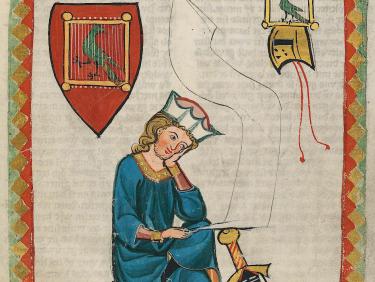Faculty of Modern Languages German Studies
Students in the German Studies degree programme will focus on German language and literature from their inception through the current day, examining their social and cultural relationships as well as their theoretical bases.
German Studies provides students with the skills they need to develop their own critical and constructive opinions with regard to current developments. Through targeted studies, including a comparative examination of past changes, students will be able to recognise and incorporate current risks and potential, e.g. in the areas of media transformation, gender roles, and other transformative practices in reading and writing. Students will learn methods for approaching academic work and will investigate societal and cultural issues and solutions from both the past and the present, including the ways in which these are articulated in language and reflected in literature. Literature and culture will be analysed in relation to their linguistic composition and their socio-historical connection. The aim of these studies is to enable students to formulate inspirational interpretations that convey a sense of the functions of linguistic and literary culture. This will provide students with a solid orientation and equip them for the demands of professional life in a wide variety of working contexts.

Special Features and Characteristics
German Studies at Heidelberg University is a comprehensive programme that includes components of Modern German Literature, Linguistics, and Medieval Studies (Ancient Language and Literature). Knowledge of language and literature are the common focus of research and instruction and will be studied in an alternation with each other. Students in the German Studies programme will learn a variety of theories and models of linguistics and literature studies, not as an end unto themselves, but in order to apply them to highly specific linguistic and literary phenomena. The wide-ranging selection of lectures and seminars provides students, early in their studies, with an opportunity to participate in on-going research.
In addition, students can take advantage of a large number of exchange programmes and partnerships with other institutes in Poland and Hungary.
Research
The areas of German linguistics, modern German literature and the languages and literature of both the medieval period and the early modern period provide a diverse range of research options, e.g.:
- Edition Research
- Language and Knowledge of the Early Modern Period
- Courtly Epoch
- Comparison of European Political Language and the Language of Criticism
- Medieval Handwriting
- Language Under National Socialism
- Cultural Interaction Between France and Germany
- Language and Medicine
- Narration in the Early Modern Period (sixteenth to eighteenth centuries)
- Text and Music
Occupational Areas
- German Teacher (teaching degree for German Gymnasium/secondary school)
- Journalism Online and Print Media
- Publishing: Fiction, Science
- Archives and Museums
- Dramaturgy; Directing; Film
- Adult Education
- Public Relations, Corporate Communications
- Culture Management
- Advertising
- Science
- Other professions that require special proficiency in the German language and literature.
Insights

Literature is the most suitable window to the world. And as I have always enjoyed reading, German Language and Literature seemed the most obvious choice. It also allows me to delve deeper into the workings of language – humanity’s most essential link.
Christian Pickert, 28, German Language and Literature, 9th semester Teaching degree



